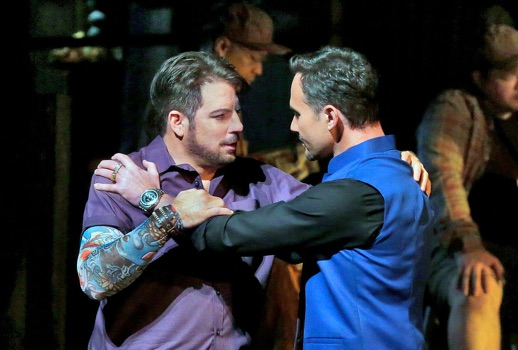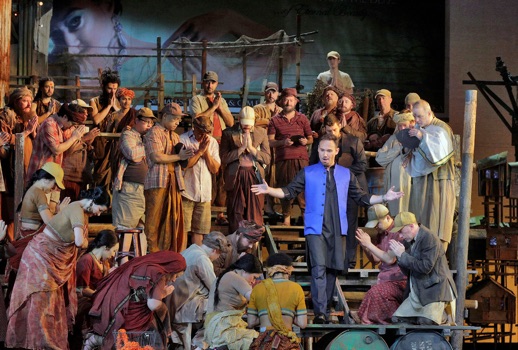

The Met could not have chosen a work more different from its previous premiere, Berg’s spiky, disquieting Lulu. Enveloped in Bizet’s meltingly memorable melodies, Thursday’s glittering audience happily reveled in the over-the-top theatrical excesses of a mini-grand opéra full of improbable coincidences in which the sympathetic if illicit lovers are thwarted by their society’s fierce religiosity. Threatened by a ferocious storm but saved during a fierce final conflagration, their true love nonetheless triumphs through the selfless sacrifice of a scorned paramour. And all in less than two and a half hours!
Greatly aided by the aptly atmospheric sets, costumes and lighting of Dick Bird, Kevin Pollard and Jen Schriever and vivid projections by 59 Productions, Woolcock moved the action from “ancient times” in Ceylon to a poor fishing village somewhere in today’s “Far East” (does anyone use that term nowadays?). However, traditionalists perturbed by updating will find little to distress themselves with here, although the “exotic” locale looked pretty run-down compared to what Bizet’s audiences would have expected.

She also drew vivid, committed performances from her cast, although Damrau was a bit too frantic at moments. Clearly a star graduate from the “Norma-Adalgisa School for Aspiring Priestesses,” the veiled Leïla arrived on the boat AWOL from La Donna del Lago. No sooner had she publically sworn a vow of chastity than she started writhing on the ground swooning at the sound of her old beau’s voice and complaining about having to spend the night in the temple (part of her job description).
Damrau improbably made Leïla’s capriciousness believable, even charming while singing with a lively approximation of French style and ravishing moonlit high notes. Her finely wrought trills were on display both in the swooning “Comme autrefois” and especially in a bewitching “O Dieu Brahma.”

Kwiecien’s early vocal roughness marred the score’s biggest hit, the stirring duet “Au fond du temple saint” in which Zurga and Nadir reminisce about the mysterious woman (Leïla, of course) with whom they both fell in love. Although some recent Pêcheurs have mined the implicit homoeroticism of Nadir and Zurga’s bond and exploited a generation of tenors and baritones who spend as much in the gym as in the vocal studio, this production kept its pair clothed, although Kwiecien did get to change out of his wet shirt at the beginning the third act.
Polenzani appeared trimmer than usual and sang with his accustomed taste and refinement. He can be a bit of a stick on stage sometimes, but Woolcock inspired him to give a more animated, specific portrayal of Nadir than one expected. As Polenzani appears so regularly at the Met and rarely stumbles vocally, it can be easy to take him for granted, but his haunting, heartfelt “Je crois entendre encore” with its breathtaking softly spun high notes again made one very grateful to have him around.

Gianandrea Noseda led a propulsive, dynamic performance that often emphasized speed and volume over delicacy. Although he accompanied his singers with care, more than once one missed an elegance invited by some of Bizet’s more inventive pages. The orchestra played well although the horns had a rough night with a few exposed bobbles, while the chorus sang lustily if a bit raucously at times.
While I have long treasured some live recordings of this piece, particularly those with Alain Vanzo, I wasn’t too sure if this opera would “work” on stage, but the vivid new Met show, originally seen at the English National Opera in 2010, proved a real pleasure: a rousing and entertaining evening of melody and mayhem starring three excellent singer-actors throwing themselves into it all heart and soul.
Photos by Ken Howard/Metropolitan Opera.

























Comments